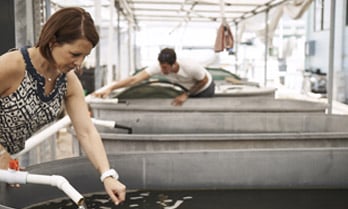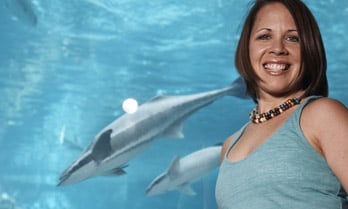Revisiting our 2016 Fellow - Dr Erin Leitao
10 January 2018
In 2016, we awarded three Australian and one New Zealand For Women in Science Fellowships. One year on, and we were eager to catch up with these Fellows to ask how their research is progressing and how winning the Fellowship influenced their career.
2016 Fellow - Dr Erin Leitao

New Zealand Fellow, Erin Leitao develops non-organic (elements other than carbon) polymers. The vast majority of synthetic chemistry is targeted at making molecules and materials containing predominantly carbon. Erin wants to make use of other main-group (inorganic) elements such as silicon, phosphorus, nitrogen, oxygen and sulphur to synthesise polymers. These alternatives to carbon are not only in high abundance, they give the potential to produce materials with unexplored properties and reactivity.
Linking atoms together to form polymers is possible by the use of a catalyst, a substance that speeds up a reaction. Currently the chemistry of linking main-group elements together is under-developed. Erin plans on developing new, efficient synthetic routes, by focusing on promising catalytic reactions that will open doors to another next generation of functional polymers and materials.
Why is it necessary to move away from carbon and use other main-group elements?
Within synthetic chemistry, carbon based molecules and materials have already made a big impact in the areas of new materials, drugs, and highly advanced devices. Most of the raw starting materials necessary to make these carbon based compounds are derived from oil and gas. There are so many other earth abundant resources out there that are under-utilised and have the potential to create new materials with properties we can’t even yet imagine.
Have you had success in linking these other elements together to form inorganic polymers? What cool new properties have you seen?
We have definitely made progress towards our goal of making new inorganic polymers. Up until now, we have focused our efforts solely on making the building blocks necessary for polymerisation, and investigating the best catalysts, but are getting very close to making some new polymers and subsequently testing the properties.
What’s your favourite thing about the research you do?
My favourite thing about the research I do is how much creative freedom we have. In this field, we can follow our curiosity and answer questions that are at the frontier of science.
Has being a FWIS Fellow influenced your research?
Being a FWIS Fellow has opened many doors for me in terms of my research. I have become much more visible at the University of Auckland which has, in the past year, increased my number of collaborations dramatically, including 4 new collaborations in the faculty, 2 with industry, and, very recently, I have become an Associate Investigator in the MacDiarmid Institute which connects me with a lot of resources for my research including an incredible network of researchers and industry partners from across NZ. Furthermore, from the publicity associated with the award, I have had a lot of interest from students wanting to join my research group and have even had the opportunity to introduce the Prime Minister at an event that I was asked to MC at the University!
What would be your advice to other young researchers?
If you find a topic that you can’t get enough of and keeps you up a night, you have found a passion in research. Take this - advance our knowledge of the world - and while you are at it, remember to persevere and try to be resilient.
The world needs science and science needs women.



